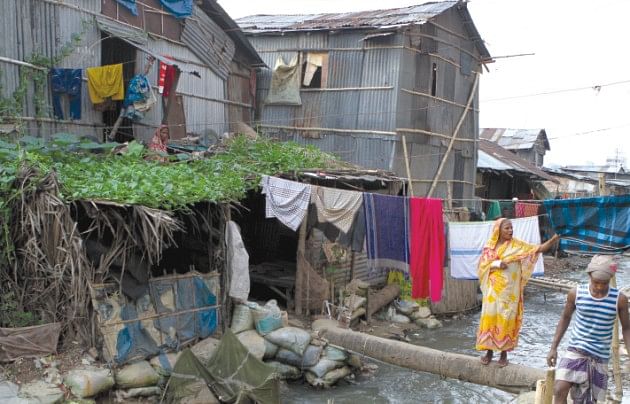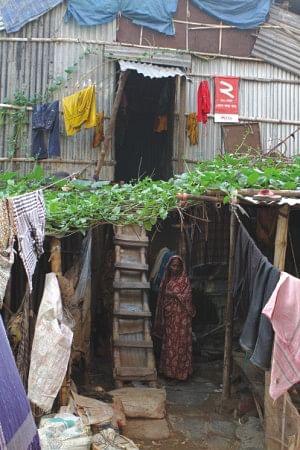At first sight it looks like any other slum in Dhaka- - an overcrowded and filthy neighbourhood inhabited mostly by the city's most vulnerable and poverty stricken people fighting an uphill battle for survival. This particular slum however has a unique characteristic – all residents originate from a place known as Ilisha situated in the island of Bhola.
The second characteristic shared by the community members of the neighbourhood called Bhola Bosti is reflective of the tales of millions of Bengalis – they have lost all their possessions to one of Bangladesh's mighty rivers. Millions of Bangladeshis have become displaced as a result of river erosion. River erosion is hardly a new phenomenon in this delta criss-crossed by numerous rivers, which results in the displacement of hundreds of thousands of people in Bangladesh.

A child crossing the filthy water full of sewage. Water from the sewer can also be seen mixing with the water supply pipes.
“Ilisha has become an island,” says Md. Babul currently a shopkeeper who had come to Dhaka when he was only a year old. He says that all the residents of Bhola Bosti share a similar history- - they have all come from Ilisha, Bhola and all of them are victims of river erosion and have come to Dhaka in search of a livelihood. “Our village does not exist anymore, instead there is only the Meghna river” he says. He explains that in the area where he was born, and where his family had been residing for generations, there is only water. The village does not have any cultivable land and there are only some isolated houses on raised homesteads in a place that once boasted a formidable human settlement. “Of course, I heard these tales from my parents and grandparents, who still dream of those good old days when our family owned cultivable land and a house.” For Babul, such memories are nothing but a myth; today Babul sits in a small tin shed house consuming a meager meal not very far from a sewer.
“When land lost to rivers re-emerges as chars, winning back possession is not feasible unless you are prepared to spend lots of money in the courts,” he says. For people like Babul living on the fringes of society, a long battle in the courts to reclaim lost land is not an option.
“Some Japanese scientists have told us these are consequences of climate change,” he smiles not really comprehending what the term 'climate change' is supposed to mean. “Whatever the reason, the fact is that there are no livelihood opportunities in Bhola; we are living a hard life in Dhaka.” Whether or not these are consequences of climate change is still a debatable and often controversial subject. However, there is no denying the fact that river erosion takes a terrible toll on villagers throughout the country. An Asian Development Bank report says that river erosion leaves at least 100,000 people landless every year in Bangladesh.

Today Babul sits in a small tin shed house consuming a meagre meal not very far from a sewer. Photo: Zahedul I khan
The island of Bhola is surrounded on three sides by the Meghna river and the Bay of Bengal to the south makes the place especially vulnerable to all sorts of natural calamities. It is no wonder therefore, that a whole community has shifted from their original habitat in Ilisha to this slum known as Bhola Bosti.
Walking through Bhola Bosti similar accounts can be heard everywhere. “Once upon a time, we owned 12 bighas of land,” says Abdul Motaleb who has been living in this slum since 1978. “We had 10 cows. Everything was lost to the river.” At first his family was adamant, they did not want to leave Bhola. “We bought more land to the south, where the water had not reached at that time. Then when the water did come, we raised the homesteads to protect our homes.” Alas, the Motaleb family was to be cruelly disappointed. After the river broke their house three times, they made the hard choice of migrating to Dhaka. Motaleb's early life in Dhaka was spent sleeping under the open sky, breaking bricks and working as a rickshaw puller until he graduated to a rickshaw painter. Eventually like many others displaced from Ilisha, he ended up in Bhola Bosti.
Residents of Bhola Bosti have said that the place, which is government owned khas land was originally under water, 30 or 40 feet deep. They drained the land and made it suitable for human habitation. Even though many of them have a whole lifetime associated with this place, most desire a return to Bhola, their homeland.

The sewer cuts across the slum. Planks like this connect the houses to the other side. Photo: Zahedul I khan
“We are unhappy here,” says Md Harun a rickshaw puller. “In this city nobody treats us with respect, in the roads people misbehave with us. We do not have anyone to share our sorrows.” He says that since there are no livelihood opportunities in Bhola, he and others like him have been forced to migrate to Dhaka. “The future of Bhola Bosti is uncertain, this is government owned land and maybe one day big companies are going to purchase this piece of land. In that case where shall we go?”
“We are not asking for resettlement in Ilisha, as we know that this is impossible. But if the government could have provided us any opportunities in any other place in Bhola, we would happily settle there.”
The migration of people from Ilisha to Bhola Bosti still continues. “I came to Dhaka a year ago with my wife and five children,” says Md Shiraj. Unlike others who had come to Dhaka earlier, Shiraj was under no illusions. “I knew beforehand that life in Dhaka is tough and there are few opportunities.” However, they have been forced by circumstances to make the inevitable choice. “We lived outside the dyke,” he says. People who reside outside the dyke are naturally more vulnerable to the waters as the dyke offers some protection against rising water levels. “At night the water had reached chest levels and the children were in danger of drowning.” For Shiraj and his family, this was a nightmarish experience. “We abandoned our homes and spent the night at a relative's home.” Everything they owned has been engulfed by the river. The Shiraj family, always poor now became destitute. “Even the fare for reaching Dhaka was given by my sister-in-law. We were completely penniless.”
 |
| Most of the houses of Bhola Bosti are raised above ground level to prevent the water from reaching their dwellings. |
“Arrangements for residing in Bhola Bosti has also been made by my sister-in-law who lived here beforehand,” he says. “We have passed many days without food, and work is very difficult to find in Dhaka.” Shiraj currently works as a day labourer wherever and whenever he can manage to find a day's work. When there is no work, they often pass their day without food.
There are others who had had their own narrow brush of death with the river Meghna. “At night, the water rushed with tremendous force and swept us away with the tide. There were three of us- - my brother, sister-in-law and myself.” Fortunately the trio had managed to hang on to each other and grabbed a jackfruit tree. “Grabbing the tree, we shouted for help.” As happens so often in rural Bangladesh, the local community had quickly mobilised rescue efforts. “There was a boat nearby and they came to our assistance upon hearing our shouts.”
Others have not been so lucky. “There are many people in our village who have lost their families to the Meghna river,” says Shamsur Nahar. “In my family, my father-in-law Nazir Horasi, my uncle-in-law Kabir Hossain and a relative Bibi Khodeja has been taken by the river.” She explains that during the monsoon season, when the river overflows and wind speed increase, the water rushes with ferocious speed consuming everything along with her including people, especially children. “There are families who have lost as many as 10 members in this way.”
“Following the catastrophe, we migrated to Dhaka under insecure circumstances as we had lost everything to the river that included our houses, livestock not to mention three members of our family. We have ended up here in Bhola bosti where we have to eat next to the sewage drain,” says Nahar pointing to the filthy drain water that cuts across the slum.
Any visitor to the slum can notice that playing in the filthy water full of raw sewage is an integral part of the children's lifestyle. “We know all too clearly that the water is poisonous. We do as much as we can to dissuade the kids from playing in the drains, but children are hard to control. All of us have to go to work and we cannot watch over our children all the time.” Another women chips in helpfully- - “As far as we know, all the sewage in the surrounding areas of Pallabi and Mirpur 10 and 12 passes through these drains,” says Minara Begum. She says that the sewage from the houses of these areas not only pass through the drain, but also mixes with their water supplies in the process making the water unusable. Yet a few feet away, a woman can be seen washing the rice in the water supply. “That water is also very unhealthy as sewage mixes with the water but what choice do we have?”
However, Minara Begum bears no grudge against the locals from whose homes the sewage flows through their neighbourhood, apparently getting into the water supply. “During the floods, the locals are very helpful,” she says. During monsoon season, when there is heavy rain, the sewage water overflows and in the process enters the homes of the community members making human habitation in the slum impossible, an eerie resemblance to the people's lives in Bhola where the river took away their lands and livelihoods. Of course, this filthy water of Dhaka is more tamable than the mighty Megha river, albeit a lot dirtier as it is full of human waste. That does not negate the fact that during the floods, the slum dwellers have to evacuate the area and take shelter somewhere else just like they did in Bhola. Most of the houses of Bhola Bosti are raised above ground level to prevent the water from reaching their dwellings.
“Last year there was a flood, not a big one but bad enough that we had to leave our homes and families behind,” says Minara. She says that they lived in a nearby field for a few days until the sewage water receded and they were able to come back and rebuild their houses. “Many houses in this place have been raised again and again, to prevent the water from destroying our homes.” She goes on to say that Tk. 5,000 was required for the renovation of her house destroyed by water. For a woman like Minara Begum who works as a domestic help, a husband who is a rickshaw puller, and two children who can only work as tokais, this is a hefty sum of money. “We had to borrow money for rebuilding our homes,” she says.
It has been 19 years since Minara Begum migrated to Dhaka from Bhola. “I always dreamt that in a few years we would have our own lands and houses,” she says. Like others before and after her in Bhola Bosti, her possessions back home have been lost to the river. Like others she had hoped that one day in the distant future she would own a house or land in Dhaka, something that she had lost to the Meghna river. With time, she has understood the hard way that dreams seldom become reality.
